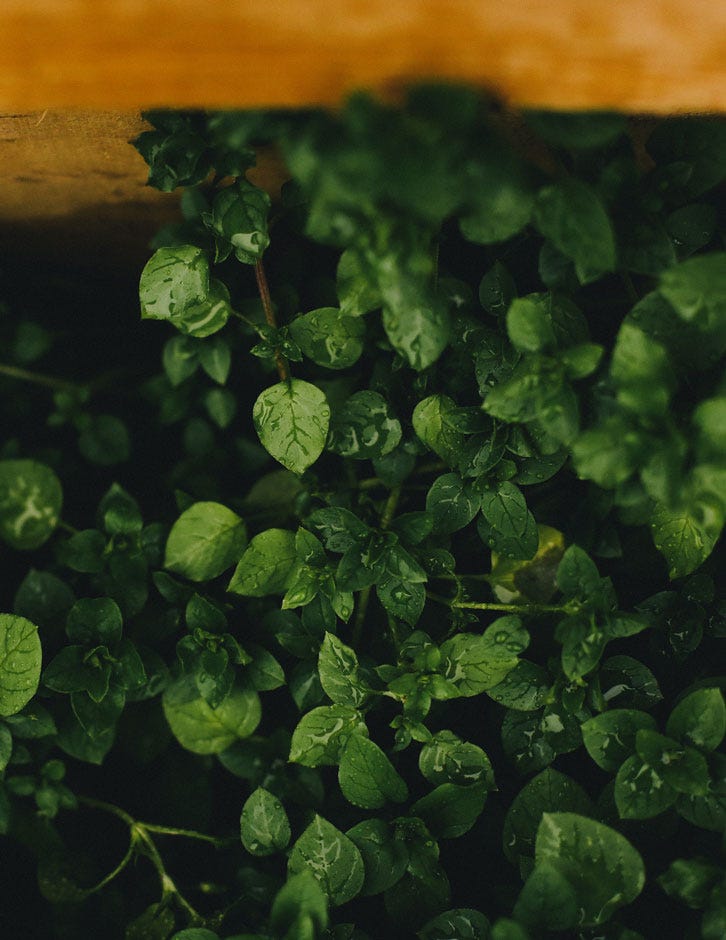Spring Salads: Chickweed
Chickweed is to the forager what iceberg lettuce is to the supermarket salad. It’s cool, neutral taste acts as a showcase for many of the wilder, peppery, bitter tastes that nature has on offer...
I love chickweed (Stellaria media, Caryophyllaceae) and am starting to eat a lot of it at the moment. It is to the forager what iceberg lettuce is to the supermarket salad. It’s cool, neutral taste acts as a showcase for many of the wilder, peppery, bitter tastes that nature has on offer. Using chickweed as a base, add wild garlic, ground ivy, dandelion leaf and garlic mustard and you will have a very well-balanced salad for free.
Chickweed grows almost everywhere, especially on cultivated or farm land where the soil has been disturbed, and seems to be present all year round. During the winter you particularly notice its weather forecasting tendencies as the tiny oval leaves fold tightly shut when cold, or when wet weather is on the way. It is small unassuming plant with minute white star-like flowers (hence the common name Starwort) and has a fresh, mild, green, almost lettuce-like flavour.
Chickweed is a delicious ingredient in soups, salads, sandwiches, steamed like spinach and in any dish where a pot-herb is required - eaten raw or cooked. It can be made into pesto, folded into omelettes or liquidised into a salad dressing with olive oil, garlic, lemon and crème fraîche. Try chopping it as a garnish like cress. It is without a doubt one of the most versatile of plants in the forager's larder.
Bunches of chickweed can also be juiced and a capful added to fruit juices and smoothies as a health drink. I advise that you only drink small amounts - shots - of the concentrated juice as large quantities are reported to produce biliousness, headaches or rheumatic pain, although it eases them in small amounts. I personally have never experienced any side effects but juicing machines are like herds of bison as far as plants are concerned and they will often react!
The juice can also be applied to insect bites to cool down stings. In the Scottish Highlands, chickweed tea was also traditionally taken as a slimming drink.
Chickweed contains vitamin C, choline, vitamin B 6+12, vitamin D and beta carotene and also a variety of minerals such as iron, calcium, potassium, phosphorous, zinc, and manganese. This benefit is extended to poultry as 'chick feed' as it is loved by birds, both caged and wild, and is also highly nutritious for them. My hens and guinea fowl go ape for it!
In herbal medicine, chickweed is known as the soothing herb and creams or ointments made of the flowering plant are used to treat skin irritation, such as eczema and rashes. It has a very cooling effect on the skin. I find that even people with the most sensitive skins usually tolerate chickweed well as it so gentle and calming. You can take it internally as a tea or tincture to ease obstinate rheumatic pain. It helps to remineralise your body, and also to soothe the respiratory tract.
So next time you’re weeding, don’t just toss it away - make a wild salad!





I was just looking at your newsletter this morning WISHING there was more. Thank you for being so in tune with all our needs. :)
Thank you! Exactly the kind of informative, useful and visual encouragement I'm needing! Happy to read on and absorb more of this....🤗🌿